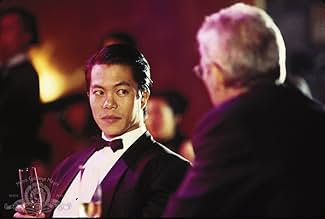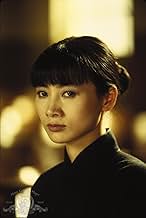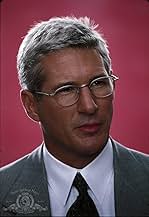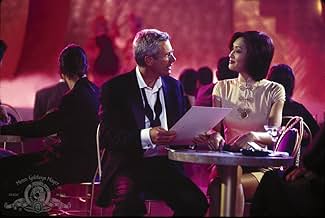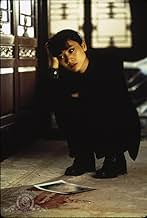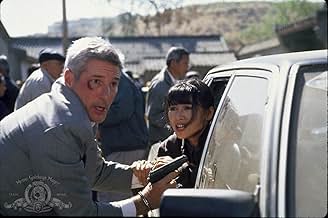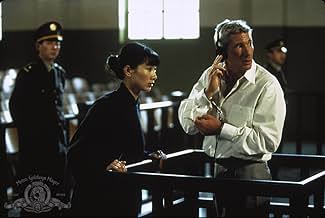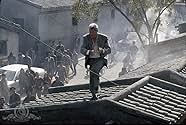VALUTAZIONE IMDb
6,3/10
18.732
LA TUA VALUTAZIONE
Un avvocato americano per affari in Cina viene arrestato ingiustamente e processato per omicidio e un'avvocatessa del paese è l'unica chiave per dimostrare la sua innocenza.Un avvocato americano per affari in Cina viene arrestato ingiustamente e processato per omicidio e un'avvocatessa del paese è l'unica chiave per dimostrare la sua innocenza.Un avvocato americano per affari in Cina viene arrestato ingiustamente e processato per omicidio e un'avvocatessa del paese è l'unica chiave per dimostrare la sua innocenza.
- Regia
- Sceneggiatura
- Star
- Premi
- 4 vittorie totali
Trama
Lo sapevi?
- QuizIn order to heighten the film's sense of reality, director Jon Avnet, actress Bai Ling, and co-producer Martin Huberty traveled to Beijing for a week of "guerilla" shooting, without the knowledge or permission of the Chinese government, to capture the first-ever 35mm film of the city to appear in a Hollywood film.
- BlooperThe closing scene of a Chinese airport reveals an American West 737. American West does not fly to China.
- Citazioni
Shen Yuelin: If you plead not guilty, you will be sentenced to death. And, unlike in your country, Mr. Moore, sentences are carried out within a week. You will be shot, and the cost of the bullet will be billed to your family.
- Curiosità sui creditiThe opening title is first displayed in Chinese "letters" (called hanzi) which then change into English.
- Colonne sonoreY.M.C.A
Written by Henri Belolo, Jacques Morali and Victor Willis
Performed by The Village People
Courtesy of Scorpio Music and Courtesy of Mercury Records, Inc.
By Arrangement with PolyGram Film & TV Licensing
Recensione in evidenza
Not well received back in 1997, this film deserved a much kinder evaluation, and in light of present geopolitical and commercial developments even appears to have been prophetic.
But of course hindsight's always easy, and since most people who reviewed Red Corner eight years ago never lived in mainland China, it was likewise not highly probable they would see it through the same jaded, seasoned eyes. And in fact, it helps to be experienced in China living when watching Red Corner, for much of its deeper mannerisms only become apparent if you know how and when to look for them.
For example, Richard Gere (as subtle and low-key as usual) portrays Jack Moore, a US-based business person willing to forego ideals and politics in order to enter the much vaunted mainland market, hyped up to be the best thing since instant noodles, when in fact like everything in life, it too comes at a price. When time arrives to sign a large media contract, Moore wants to pause and assess particulars by the book. He also notices China's newly-found penchant for blunt nationalism (oops, "patriotism", done nicely by a scene where he gauges club-goers' vehement reactions to a coaxing DJ), and doesn't quite feel good about his local contacts (including excellent veteran James Hong).
But as a simple mortal, Moore joins a gorgeous catwalking model (Jessey Meng) at his hotel room for a night of brief pleasures. Brief, because the next morning begins with him dragged away by Beijing cops who, having found the girl's dead body in the room and her fresh blood all over him, proceed to assume the American guilty.
Now, Red Corner's not a racist film. It doesn't fall into obvious stereotypes, nor does it contain any racial slurs (or profanity at all). Asians aren't made to be villains, just as the uncaring US embassy staff do not in any way represent the Western contingent. Having said that, the movie doesn't shy away from painful issues. It clearly conveys xenophobic attitudes found among mainland people and authorities, as many who've lived there can attest to. Of course, not everyone's like that, and competent actress Bai Ling (The Crow, Anna and the King) does well as Moore's honest, crusading defense attorney, Shen Yuelin, during what quickly devolves into a kangaroo court.
Meanwhile, Red Corner shows the abusive treatment our protagonist's subjected to, often to the point of endangering his life. When asked, Shen Yuelin's assistant says that Moore's frequent beatings are simply "because he's a foreigner", a familiar sentiment to non-Chinese residents of the mainland.
Similarly, the Americans involved in this legal fiasco wish to distance themselves from aiding Moore, as doing so might work against commercial interests based on sheer greed. Thus Red Corner preceded its time by faithfully showing how global factions are willing to play along just to get that great juicy carrot dangling from a stick most don't want to acknowledge. As of 2005, companies like Microsoft and HP openly pursue a policy of appeasement when it comes to China, willingly accepting political strings attached to what are supposed to be mere commercial activities.
And if you don't consider all that a sign of the film's credibility, how about the fact that mainland authorities quickly moved to ban it and prevent its cast and crew from entering China? Just for its attempt to challenge an authoritarian mindset and stand for free expression alone should Red Corner be applauded.
Additionally, it's a mostly believable project from start to finish, accurately sampling many of China's social staples through concepts such as "guanxi" (connections) and "da ge" (basically a nickname for somebody more respected than oneself), yet doesn't make any claims of exotica, while steering clear of clichés (save for Yuelin living with her kindly old grandmother). There's one scene showing Yuelin speaking to a police official in English so as to avoid making him "lose face", which is utter nonsense of course (probably the actor doesn't speak Chinese).
Moore himself speaks just a bit Putonghua (standard Chinese), as do many of the business people and newly-arrived in mainland China. Again, familiar from real life, as was the interaction between him and the locals. Beyond that, for something made almost entirely in California, Red Corner passes for Beijing with very few glitches (vehicles sometimes don't look authentic), featuring ample attention to detail and an atmosphere faithful to the original. Certainly, some footage was covertly shot in Beijing itself, yet due to the government's disapproving attitude, production had to relocate back to the States. All in all, Red Corner also plays it fair, going to show that China does have judicial systems with a potential to work as well as any others. It makes a point of addressing the mainland's criminal code, and court hearing procedures all appear in detail. Plus, eventually the truth does come out, and while it's pretty obvious who dunnit from the get go, this isn't the main point here.
The point is a warning against oppression wherever it may be and whatever form it may take, and a cautionary note regarding the perils of blind opportunism. Just because somebody promises you a gilded prize for playing by their rules doesn't mean those rules stop applying once the prize is obtained, if at all. And if we're not careful, there won't be too many reviews of this critical nature in times to come. Relations with China, as with any other nation, should be equivocal and based on standing for your own values, not another's, and that means not compromising liberties and freedoms standing at the very core of enlightened, progressive society. Like Red Corner's tagline says, leniency for those who confess and comply, severity for those who dare resist, that will be our downfall.
Rating: * * * *
But of course hindsight's always easy, and since most people who reviewed Red Corner eight years ago never lived in mainland China, it was likewise not highly probable they would see it through the same jaded, seasoned eyes. And in fact, it helps to be experienced in China living when watching Red Corner, for much of its deeper mannerisms only become apparent if you know how and when to look for them.
For example, Richard Gere (as subtle and low-key as usual) portrays Jack Moore, a US-based business person willing to forego ideals and politics in order to enter the much vaunted mainland market, hyped up to be the best thing since instant noodles, when in fact like everything in life, it too comes at a price. When time arrives to sign a large media contract, Moore wants to pause and assess particulars by the book. He also notices China's newly-found penchant for blunt nationalism (oops, "patriotism", done nicely by a scene where he gauges club-goers' vehement reactions to a coaxing DJ), and doesn't quite feel good about his local contacts (including excellent veteran James Hong).
But as a simple mortal, Moore joins a gorgeous catwalking model (Jessey Meng) at his hotel room for a night of brief pleasures. Brief, because the next morning begins with him dragged away by Beijing cops who, having found the girl's dead body in the room and her fresh blood all over him, proceed to assume the American guilty.
Now, Red Corner's not a racist film. It doesn't fall into obvious stereotypes, nor does it contain any racial slurs (or profanity at all). Asians aren't made to be villains, just as the uncaring US embassy staff do not in any way represent the Western contingent. Having said that, the movie doesn't shy away from painful issues. It clearly conveys xenophobic attitudes found among mainland people and authorities, as many who've lived there can attest to. Of course, not everyone's like that, and competent actress Bai Ling (The Crow, Anna and the King) does well as Moore's honest, crusading defense attorney, Shen Yuelin, during what quickly devolves into a kangaroo court.
Meanwhile, Red Corner shows the abusive treatment our protagonist's subjected to, often to the point of endangering his life. When asked, Shen Yuelin's assistant says that Moore's frequent beatings are simply "because he's a foreigner", a familiar sentiment to non-Chinese residents of the mainland.
Similarly, the Americans involved in this legal fiasco wish to distance themselves from aiding Moore, as doing so might work against commercial interests based on sheer greed. Thus Red Corner preceded its time by faithfully showing how global factions are willing to play along just to get that great juicy carrot dangling from a stick most don't want to acknowledge. As of 2005, companies like Microsoft and HP openly pursue a policy of appeasement when it comes to China, willingly accepting political strings attached to what are supposed to be mere commercial activities.
And if you don't consider all that a sign of the film's credibility, how about the fact that mainland authorities quickly moved to ban it and prevent its cast and crew from entering China? Just for its attempt to challenge an authoritarian mindset and stand for free expression alone should Red Corner be applauded.
Additionally, it's a mostly believable project from start to finish, accurately sampling many of China's social staples through concepts such as "guanxi" (connections) and "da ge" (basically a nickname for somebody more respected than oneself), yet doesn't make any claims of exotica, while steering clear of clichés (save for Yuelin living with her kindly old grandmother). There's one scene showing Yuelin speaking to a police official in English so as to avoid making him "lose face", which is utter nonsense of course (probably the actor doesn't speak Chinese).
Moore himself speaks just a bit Putonghua (standard Chinese), as do many of the business people and newly-arrived in mainland China. Again, familiar from real life, as was the interaction between him and the locals. Beyond that, for something made almost entirely in California, Red Corner passes for Beijing with very few glitches (vehicles sometimes don't look authentic), featuring ample attention to detail and an atmosphere faithful to the original. Certainly, some footage was covertly shot in Beijing itself, yet due to the government's disapproving attitude, production had to relocate back to the States. All in all, Red Corner also plays it fair, going to show that China does have judicial systems with a potential to work as well as any others. It makes a point of addressing the mainland's criminal code, and court hearing procedures all appear in detail. Plus, eventually the truth does come out, and while it's pretty obvious who dunnit from the get go, this isn't the main point here.
The point is a warning against oppression wherever it may be and whatever form it may take, and a cautionary note regarding the perils of blind opportunism. Just because somebody promises you a gilded prize for playing by their rules doesn't mean those rules stop applying once the prize is obtained, if at all. And if we're not careful, there won't be too many reviews of this critical nature in times to come. Relations with China, as with any other nation, should be equivocal and based on standing for your own values, not another's, and that means not compromising liberties and freedoms standing at the very core of enlightened, progressive society. Like Red Corner's tagline says, leniency for those who confess and comply, severity for those who dare resist, that will be our downfall.
Rating: * * * *
I più visti
Accedi per valutare e creare un elenco di titoli salvati per ottenere consigli personalizzati
- How long is Red Corner?Powered by Alexa
Dettagli
- Data di uscita
- Paese di origine
- Sito ufficiale
- Lingue
- Celebre anche come
- Red Corner
- Luoghi delle riprese
- Pechino, Cina(Establishing shots, including the opening scenes were shot in Beijing, including a bicycle ride through Tiananmen Square.)
- Aziende produttrici
- Vedi altri crediti dell’azienda su IMDbPro
Botteghino
- Budget
- 48.000.000 USD (previsto)
- Lordo Stati Uniti e Canada
- 22.459.274 USD
- Fine settimana di apertura Stati Uniti e Canada
- 7.403.362 USD
- 2 nov 1997
- Lordo in tutto il mondo
- 22.459.274 USD
- Tempo di esecuzione2 ore 2 minuti
- Colore
- Mix di suoni
- Proporzioni
- 1.85 : 1
Contribuisci a questa pagina
Suggerisci una modifica o aggiungi i contenuti mancanti

Divario superiore
What is the Brazilian Portuguese language plot outline for L'angolo rosso - Colpevole fino a prova contraria (1997)?
Rispondi

